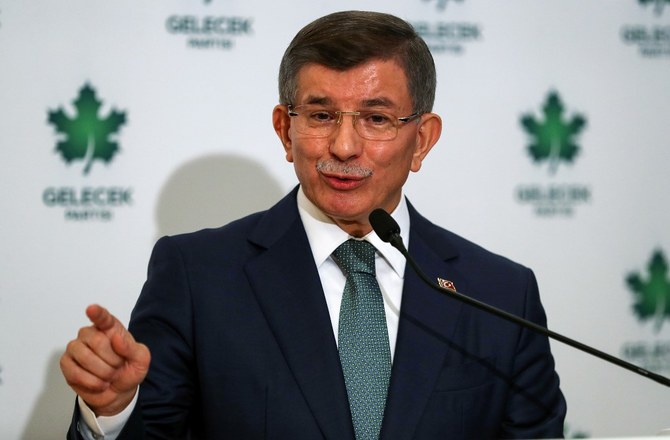LONDON: Former Turkish prime minister Ahmet Davutoglu said he is ready to cooperate with opposition parties to stand against the ruling Justice and Development Party (AKP), Al Arabiya reported.
Davutoglu, once a close ally of President Recep Tayyip Erdogan, now leads an opposition party after splitting from the AKP.
Davutoglu was speaking at a meeting on Saturday with members of his Future Party as it prepared for possible early parliamentary or presidential elections, the report said.
He said Turkey needed a new political vision and that the current government was unfit to manage daily crises.
“Turkey cannot bear a policy that sets barriers between political parties,” Davutoglu said according to the report. “The country’s future and the nation’s peace are not entitled to one party.”
He also criticized the government’s failure to manage the COVID-19 crisis.
Turkey’s next elections are scheduled for 2023, but speculation has been mounting that they could be called as early as November.
According to polls undertaken between February and May, Davutoglu’s Future Party and another AKP splinter party, former economy czar Ali Babacan’s DEVA receive %1.6 and 2% of the national vote, respectively. However, pundits claim both parties are slowly surging in the polls, as undecideds reaching 15-20% of the total electorate are shifting to these two newcomers.
AKP and MHP are working on legislation to bar Future and DEVA from the next elections—if these were to be held in 2020. The new legislation is alleged to amend the Law on elections, too, with a view to maximize the advantages of the partners. While details vary from source to source, a first-through-the-post system like in US and UK is one of the options. Another option is a smaller number of multi-candidate election districts, where each party will have to receive at least 20% of the total vote to qualify for the Grand Assembly.
Turko-German social scientist Dr Sinem Adar who works in Germany told Gazete Duvar daily that DEVA and Future Parties could attract votes from AKP in overseas polling, thus reducing one of its biggest advantages, namely a great number of guest-workers and families in Europe who retain their conservative political habits.
According to KONDA survey agency CEO Bekir Agirdir, AKP’s core vote declined below 30%, much less than the 45%+ it has received in the last two elections, but the newly detached are yet to pick a new address.
Prof Ali Akarca who is a tenured professor at University of Illinois, Chicago, claims Erdogan will need to steer the economy to a high growth path to repeat his past election victories.
Sources: Al Arabiya, T24, ParaAnaliz
You can follow our English language YouTube videos @ REAL TURKEY: https://www.youtube.com/channel/UCKpFJB4GFiNkhmpVZQ_d9Rg
And content at Twitter: @AtillaEng
Facebook: Real Turkey Channel: https://www.facebook.com/realturkeychannel/
